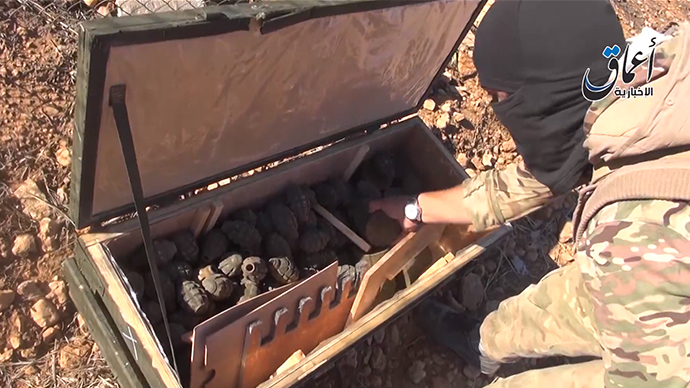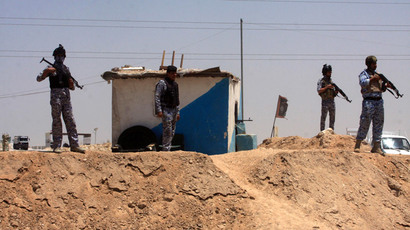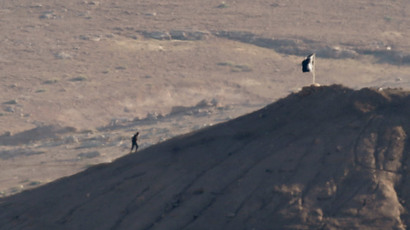Pentagon admits weapons-drop fail as anti-ISIS operation hits $424mn

The Pentagon has admitted that a chunk of its cache of weapons meant for Kurdish forces battling Islamic State militants in Kobani has fallen into terrorist hands. The Turkish president has been voicing his frustration with Washington over this.
On Wednesday, the US defense body went against earlier government claims that American weapons always reach its intended destinations and had to concede that two bundles out of a total of 28 intended for the Kurds have indeed ended up with the terrorists.
The militants’ advances on the Syrian-Turkish border are what spurred Washington into action in the first place.
This comes as the Islamic State (IS, formerly ISIS/ISIL) posted a video showing off brand-new American hardware in boxes with English writing and a parachute splayed out just beside the windfall.
"Yesterday we announced that one resupply bundle went astray and was destroyed. We have since relooked at that and we have determined that a second bundle also went astray and probably fell into enemy hands," Pentagon spokesman Army Colonel Steve Warren said.
One of the bundles was later destroyed in an airstrike.
READ MORE: Right into enemy hands? ISIS shows off new weapons allegedly airdropped by US (VIDEO)

The video itself caused quite a stir on the social media landscape with users ‘thanking’ Washington for delivering the arms into the wrong hands, something the US has in the past vowed to avoid.
The previous day saw a much more optimistic White House, when Deputy National Security Advisor Ben Rhodes insisted to CNN that the administration feels “very confident that, when we air drop support as we did into Kobani… we’ve been able to hit the target in terms of reaching the people we want to reach.”
It was Washington which earlier maintained that the air drops were of the utmost urgency for the border town of Kobani to remain intact, and that it was high time to take a more drastic approach to “degrading and destroying” the IS, which outnumbered and outgunned the Syrian-Kurdish resistance.
The fight against IS terrorists has so far cost Washington approximately $424 million since the start of the operation on August 8, according to the Pentagon spokesman, Rear Admiral John Kirby. He averaged the defense body’s spending to be around $7.6 million a day.
The Syria campaign has so far lasted about a month. American air strikes there have so far killed 553 people, including 32 civilians.
But the current failure to deliver lethal equipment into the right hands is not an isolated incident – merely the latest in a series of gains by IS terrorists rampaging through northern Syria and Iraq, where millions of dollars in American equipment had already been collected from abandoned military bases.
It has in some circles become common sense that the threat posed by the IS has been greatly facilitated by America, whose weapons manufacturers are now reaping the benefits of the destruction caused by the terrorists by advocating for more weapons exports.
“In terms of the companies’ interests, profit and revenue, surely war facilitates that if you’re a defense industry. The irony is that the US and the larger coalition is using these weapons oftentimes against Islamic State, which has been armed inadvertently by the US and these Sunni-coalition countries. Because we provided arms in the context of the Arab awakening to support the uprising against [Alawite (Shiite) Syrian President] Assad. And Islamic State ended up prying these weapons away from the so-called ‘moderate Syrian rebels’, as well as by scaring the Iraqi federal forces into submission. And the US had been arming to the teeth the Iraqi government,” Max Abrahms, an expert on terrorism at Northeastern University, told RT.

Turkish frustration
“It has emerged that what was done was wrong,” came the reaction from Turkish President Tayyip Erdogan, as cited by Hurriyet Daily News, when word of the delivery failure broke.
Turkey was adamantly opposed to any deliveries – military or otherwise – to Kurdish forces, which it views as ‘terrorists’. It was in fact the PYD [the Syrian-Kurdish Democratic Union Party forces] that bore the brunt of the IS onslaught on the Syrian-Turkish border town, as Istanbul’s tanks kept a watchful eye from a distance.
When asked earlier if it would intervene to help repel the terrorist group that earlier promised to “liberate Istanbul,” the Turkish government said it would, only in the event of Turkish soldiers being endangered. It referred to the troops guarding a historical landmark inside Syria the Turkish believe to be rightfully theirs.
READ MORE: Kobani is about to fall to jihadists - Turkey's president
Now Erdogan also appears frustrated that the Kurdish forces were sent any weapons at all.
“We told [US President Barack Obama] that ‘Support that you will lend to the PYD and the PKK is not acceptable to us.’” He could have been referring to a weekend conversation with the US leader, who tried to implore him to reconsider the air drops.
“Two days passed, we are in the third/fourth day, Kobani didn’t fall. Moreover, I have difficulty in understanding why Kobani is this much strategic for [the US], because there are no civilians left in Kobani anymore; 200,000 people crossed into Turkey and we are hosting them. Only around 2,000 fighters are left in Kobani and they didn’t say ‘yes’ to Peshmerga first, but now, at the last moment, they said ‘yes’. And we told [Obama] we would be ‘helpful’ about this.”
“Such an operation cannot be defined and explained. That’s to say, a healthy comment cannot be made in regards to whether a result will be obtained through this or not. To whom and to where you are lending support, everything is obvious,” the Turkish leader claimed.














